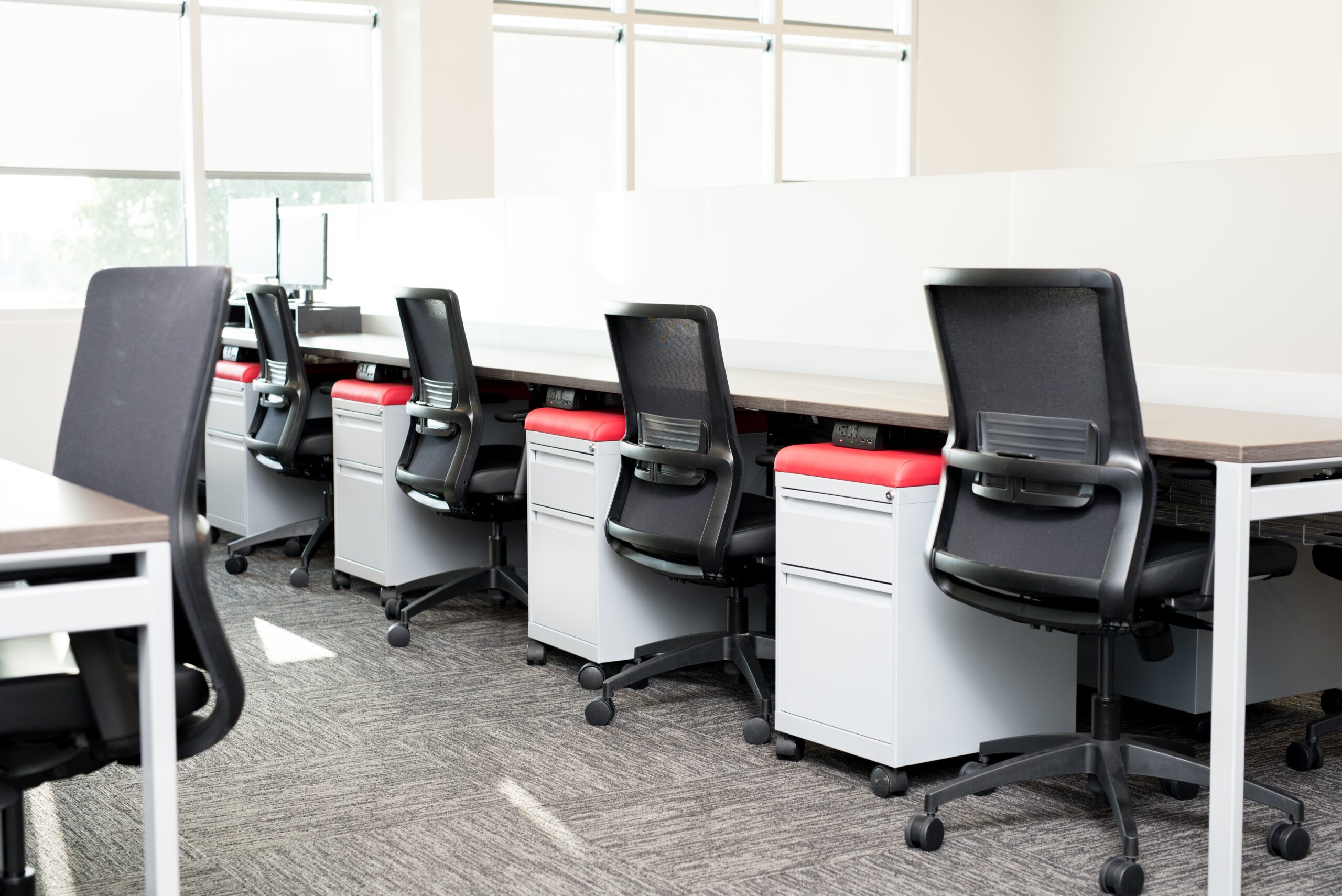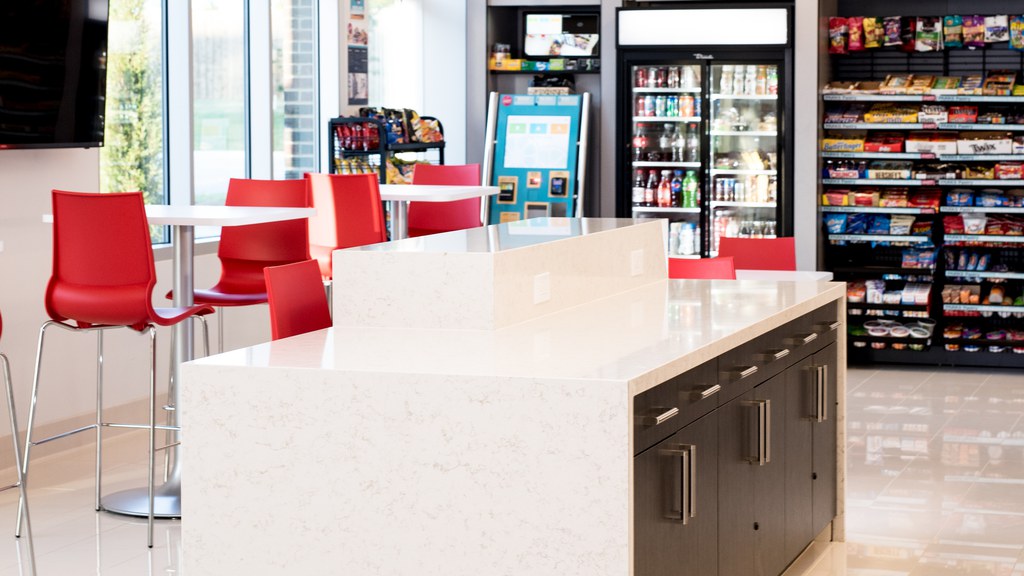Coworking spaces offer a unique environment that fosters creativity, collaboration, and community. They provide a space where professionals from different fields can work together, share ideas, and collaborate on projects.
The purpose of this blog is to use our expertise at CityCentral to provide insights into:
- The meaning of coworking and its core principles
- The benefits of coworking
- The types of coworking spaces
- How to choose the right coworking space
After reading this, you will have a solid understanding of whether coworking may be a fit for your business. Let’s dive in!
Coworking Meaning
The concept of coworking is current and evolving. These shared offices offer entrepreneurs, freelancers, and remote workers a flexible and collaborative atmosphere.
The four main coworking traits are:
Shared Spaces
People share resources and work on projects in shared workspaces. Open desks, private offices, meeting rooms, and event spaces are examples.
People share resources and work on projects in shared workspaces. Open desks, private offices, meeting rooms, and event spaces are examples.
Mixed community
People from different origins, sectors, and professions work and interact in the diversified community. This creates a lively, exciting environment where people can learn and grow.
People from different origins, sectors, and professions work and interact in the diversified community. This creates a lively, exciting environment where people can learn and grow.
Flexibility
A major benefit of coworking is flexibility. Members can choose their schedule, type of office, and length of membership. This permits them to function productively outside of an office.
A major benefit of coworking is flexibility. Members can choose their schedule, type of office, and length of membership. This permits them to function productively outside of an office.
Collaboration
Ultimately, coworking requires collaboration. Members are encouraged to exchange ideas, talents, and resources to solve issues and create opportunities.
Ultimately, coworking requires collaboration. Members are encouraged to exchange ideas, talents, and resources to solve issues and create opportunities.
Unlike typical offices, coworking spaces offer more than simply a workspace. A friendly community, networking, mentorship, events, and workshops are just a few of the many benefits.
Coworking is cheaper and more flexible than typical office locations, which require extended leases.
Coworking spaces also welcome people of various backgrounds and identities. A modern solution to the changing nature of work, coworking stimulates creativity, productivity, and cooperation.
Example of the exterior of a coworking space (courtesy of Strive Workspaces):

The Advantages of Coworking
Coworking spaces have many advantages:
Enhanced Productivity
Coworking rooms are organized to reduce distractions and boost productivity. Working with like-minded people keeps you focused and motivated.
Coworking rooms are organized to reduce distractions and boost productivity. Working with like-minded people keeps you focused and motivated.
Cost-effective Options
Coworking spaces are affordable for business owners and entrepreneurs who cannot hire an office. Sharing costs with other members reduces overhead and offers variable leasing terms.
Coworking spaces are affordable for business owners and entrepreneurs who cannot hire an office. Sharing costs with other members reduces overhead and offers variable leasing terms.
Opportunities to Network
Build your professional network and create new connections in coworking spaces. You can share skills and knowledge and gain project feedback with other users.
Build your professional network and create new connections in coworking spaces. You can share skills and knowledge and gain project feedback with other users.
Work-Life Balance
Separating work and personal life in coworking spaces improves work-life balance. Working in a professional setting lets you avoid telework distractions and enjoy yoga and meditation.
Separating work and personal life in coworking spaces improves work-life balance. Working in a professional setting lets you avoid telework distractions and enjoy yoga and meditation.
Amenities Access
Coworking spaces provide high-speed internet, meeting and conference rooms, and shared office equipment. This saves time and money by eliminating the need to set up office infrastructure.
Coworking spaces provide high-speed internet, meeting and conference rooms, and shared office equipment. This saves time and money by eliminating the need to set up office infrastructure.
Coworking spaces can help you succeed with enhanced productivity, cost-effective solutions, networking, a balanced workstyle, and amenities.
Interested in coworking? Visit CityCentral to learn about coworking and get a FREE day trial!

4 Coworking Space Types
Understanding the types of coworking spaces is essential to understanding coworking:
1) Conventional coworking spaces
The most frequent sort of coworking center is traditional, and many, like WeWork, offer several perks. They include conference rooms, private offices, shared workspaces, and community events.
The most frequent sort of coworking center is traditional, and many, like WeWork, offer several perks. They include conference rooms, private offices, shared workspaces, and community events.
They generally welcome freelancers, entrepreneurs, and small business owners who need a workspace.
2) Niche Shared Spaces
Certain industries and interests are catered to in these coworking spaces. Coworking spaces serve writers, artists, tech startups, and lawyers. Member-specific equipment, resources, and programming are common in these venues.
Certain industries and interests are catered to in these coworking spaces. Coworking spaces serve writers, artists, tech startups, and lawyers. Member-specific equipment, resources, and programming are common in these venues.
3) Corporate Coworking
Coworking facilities are becoming more popular for large companies to offer flexible workspaces. Business centers near a company’s headquarters or offices may offer exclusive amenities or services to employees.
Coworking facilities are becoming more popular for large companies to offer flexible workspaces. Business centers near a company’s headquarters or offices may offer exclusive amenities or services to employees.
4) Coworking Online
New online coworking spaces allow people to connect and collaborate. Virtual coworking spaces allow members to share resources, network online, and meet industry leaders from anywhere.
New online coworking spaces allow people to connect and collaborate. Virtual coworking spaces allow members to share resources, network online, and meet industry leaders from anywhere.

Choosing a Space
Selecting a coworking space might be overwhelming with so many alternatives. Nonetheless, considering the following aspects will help you find a coworking space that meets your needs:
1) Location and Accessibility
Location matters when choosing a coworking space. Choose a location near your house or clients that’s easy to reach.
Location matters when choosing a coworking space. Choose a location near your house or clients that’s easy to reach.
You should also consider space accessibility. Is there enough parking or public transit? Does the building accommodate disabled people?
2) Amenities and Facilities
While picking a coworking location, examine the amenities and services. Examples include:
While picking a coworking location, examine the amenities and services. Examples include:
- Fast internet
- Printing and scanning
- Rooms for conferences
- Kitchen
- On-site reception
Compare a space’s amenities to your needs and whether they’re included in the membership fee.
3) Community and Culture
The community and culture of a coworking space can also influence your decision. Some coworking spaces are more laidback, while others emphasize networking and collaboration.
The community and culture of a coworking space can also influence your decision. Some coworking spaces are more laidback, while others emphasize networking and collaboration.
Evaluate your ideal community and whether the place matches your beliefs.
4) Cost and Membership
Finally, examine coworking space cost and membership levels. Some spaces charge a fixed cost for unlimited entry, while others have usage-based rates. Understand the pricing and whether it suits your budget.
Finally, examine coworking space cost and membership levels. Some spaces charge a fixed cost for unlimited entry, while others have usage-based rates. Understand the pricing and whether it suits your budget.
Consider these considerations to find a coworking space that suits your needs and helps you succeed.
Considering a Coworking Space?
Flex office space allows people to work collaboratively and supportively at a lower cost than standard office facilities.
Coworking environments boost productivity, creativity, networking, and resource availability. Coworking also fosters community and belonging, which helps reduce remote work’s loneliness.
For individuals seeking a trendy and dynamic environment, coworking space has many advantages.
